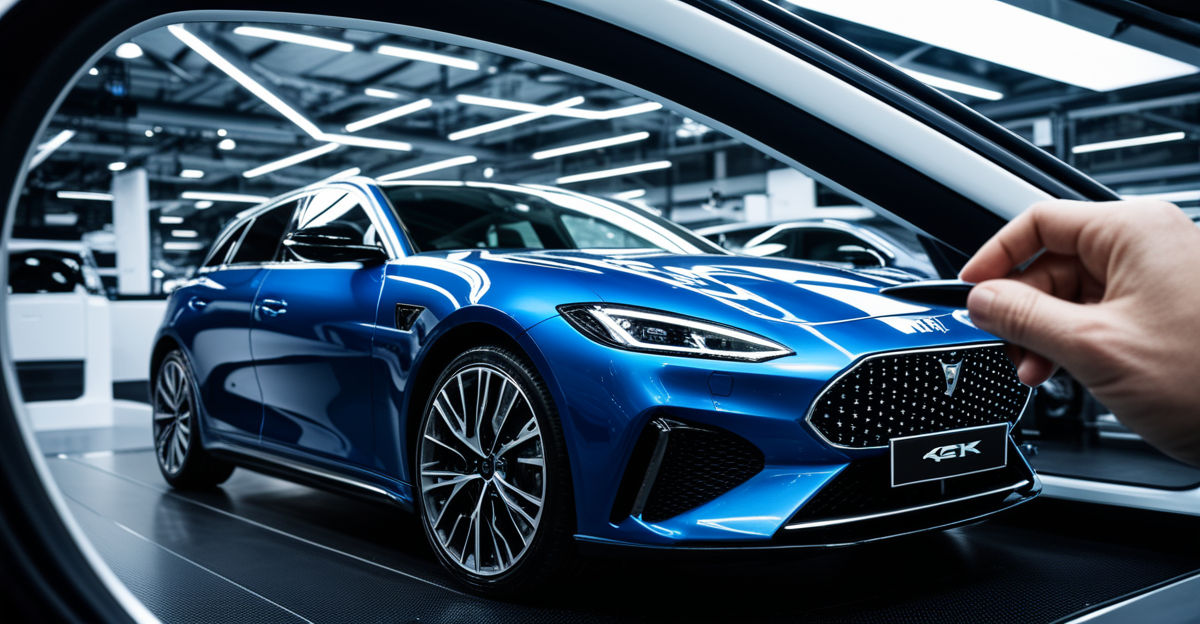Emerging Technologies Shaping the Future of UK Automotive
The UK automotive industry is rapidly evolving, driven by several key technological advancements that are redefining vehicle design, production, and user experience. Among the most impactful are developments in electrification, connectivity, and manufacturing innovation. These emerging technologies are critical for the UK to maintain a competitive edge internationally.
Innovation in electric powertrains, such as battery improvements and alternative fuels, is transforming vehicle capabilities and environmental impact. Meanwhile, progress in autonomous driving and connected car technologies is reshaping how vehicles interact with each other and infrastructure, enhancing safety and convenience.
Topic to read : How Has the UK Automotive Industry Evolved Over the Decades?
In manufacturing, the integration of automotive AI and automation in Industry 4.0 smart factories is boosting production efficiency and quality control. These advancements not only streamline processes but also reduce costs and lead times.
Sustained investment in research and development, supported by evolving regulations, is essential for these technological advancements to reach full potential. Embracing innovation allows the UK automotive industry to adapt to global market demands while promoting sustainability and resilience in an increasingly digital automotive landscape.
Topic to read : How are UK automakers leveraging renewable energy in production?
Key Technological Innovations Shaping the UK Automotive Sector
The UK automotive industry is undergoing a profound transformation fueled by several emerging technologies. A critical trend is the widespread shift to electric vehicles, supported by advances in battery technology that enhance vehicle range and charging efficiency. This electrification movement aligns closely with government policies incentivising cleaner, greener transportation alternatives.
Connected cars represent another revolutionary development. These vehicles rely on sophisticated communication systems to interact with other cars and infrastructure, enabling smarter traffic management and enhanced safety features. The UK benefits from a proactive regulatory landscape encouraging the integration of such connectivity innovations.
Automation and alternative propulsion further define the innovation landscape. Automation in manufacturing streamlines production while maintaining quality. Concurrently, alternative propulsion technologies, including hydrogen fuel cells, complement electrification to diversify the sector’s sustainability strategy.
In sum, the sector’s evolution is shaped by electrification, connectivity, automation, and alternative propulsion. UK-specific policies, industry partnerships, and focused R&D investments ensure these emerging technologies translate into competitive advantages. This collaborative ecosystem is essential for positioning the UK firmly as a leader in the future of automotive technology.
Electric Vehicles and Battery Innovation in the UK
The UK automotive manufacturing sector is experiencing rapid expansion in electric vehicles (EVs), driven by significant advancements in battery technology. New battery chemistries and improved energy density enable longer driving ranges, addressing a key consumer concern. Enhanced charging speeds and battery durability further accelerate EV adoption.
Government initiatives play a crucial role in this growth. Funding schemes and grants support innovation hubs and manufacturers focused on electrification, helping the UK maintain its edge globally. For example, investments in battery gigafactories underline governmental commitment to domestic supply chains.
The economic impact is substantial. Growth in EV production creates skilled jobs and attracts investment, while reducing dependency on imported fossil fuels. Environmentally, the shift to EVs decreases vehicle emissions significantly, aligning with the UK’s net-zero targets.
In summary, electric vehicles and battery innovation act as pillars for the UK automotive industry’s transformation. These advancements not only enhance vehicle performance but also bolster the country’s economic resilience and environmental commitments. The continued emphasis on such technologies ensures the UK remains a frontrunner amid shifting global automotive dynamics.
Electric Vehicles and Battery Innovation in the UK
The UK automotive manufacturing landscape is experiencing a notable surge in the adoption of electric vehicles (EVs), driven by continuous advancements in battery technology. Improved battery energy density and faster charging capabilities have made EVs more practical for everyday use. This progress prompts automakers to accelerate production of electric models catering to growing consumer demand.
The UK government plays a pivotal role by launching initiatives that support electrification, including substantial investments in battery research facilities and charging infrastructure expansion. These policies aim to establish the UK as a global hub for battery innovation while reducing carbon emissions aligned with climate targets.
Economic benefits are significant. Scaling up EV production bolsters domestic supply chains and creates skilled manufacturing jobs. Environmentally, widespread EV adoption helps the UK automotive industry cut its carbon footprint, advancing sustainability goals.
In summary, technological strides in battery design combined with strategic government investment create a strong foundation for expanding the UK’s role in the electric vehicle market. This integrated approach positions the UK automotive manufacturing sector to lead in the emerging electric mobility era.
Autonomous and Connected Vehicles: A Future Roadmap
Driverless technology in the UK automotive industry is advancing rapidly, with numerous trials and testing sites enabling the development of fully autonomous vehicles. These vehicles leverage sophisticated sensors, AI algorithms, and real-time data processing to navigate complex environments safely.
Connected cars enhance this autonomy by enabling vehicles to communicate with each other and infrastructure through Vehicle-to-Everything (V2X) technology. This connectivity improves traffic flow, reduces accidents, and supports smart city initiatives. AI integration plays a pivotal role, allowing cars to learn from data patterns and adapt their behaviour dynamically.
UK-based tech companies and automotive manufacturers are heavily invested in this future, collaborating to develop standards and innovate software platforms. Their efforts align with governmental policies promoting safer, greener mobility solutions.
In practice, these technologies enable scenarios such as coordinated platooning on highways and predictive maintenance alerts. The combined impact is significant: increased road safety, reduced congestion, and lower emissions, while positioning the UK as a global leader in autonomous and connected vehicle innovation.
Key Technological Innovations Shaping the UK Automotive Sector
The UK automotive industry is undergoing transformative change driven by multiple emerging technologies. Central to this evolution are the combined influences of electrification, connectivity, automation, and alternative propulsion methods. These trends are not isolated; instead, they interact within a robust UK policy framework encouraging innovation.
Electric vehicles dominate the sector’s technological shift. Improvements in battery capacity and charging continue to drive adoption. Alongside electrification, connected cars enhance road safety and traffic flow using vehicle-to-vehicle and vehicle-to-infrastructure communication systems. These technologies rely on advanced sensors and real-time data exchange, enabling smarter and safer journeys.
Automation also plays a pivotal role. The integration of robotics and AI in manufacturing boosts efficiency and quality while adapting production to evolving consumer demands. The UK’s strategic investments and regulatory support further stimulate industry growth.
Together, these innovations position the UK automotive sector to lead in sustainable transport and smart mobility. Embracing emerging technologies ensures that the industry remains competitive globally, responsive to environmental imperatives, and aligned with the digital future of transportation.
Key Technological Innovations Shaping the UK Automotive Sector
The UK automotive industry is embracing several core emerging technologies that drive transformation in both manufacturing and vehicle design. Electrification remains a leading trend, with electric vehicles becoming central to the sector’s future. Advances in battery performance directly support this shift, boosting EV appeal and practicality.
Alongside electrification, connected cars are reshaping automotive experiences through enhanced vehicle-to-vehicle and vehicle-to-infrastructure communication. This connectivity enables smarter traffic management and improved safety measures, responding to increasing urban and regulatory demands.
Automation also plays a significant role within UK production lines. The adoption of robotics and digital systems optimises efficiency and quality, supporting the manufacturing of more complex EV and connected car components. Additionally, alternative propulsion technologies, such as hydrogen fuel cells, diversify the sector’s sustainability framework.
Crucially, this innovation flourishes within a supportive UK-specific policy environment. Government incentives and regulatory frameworks actively encourage the integration of these technologies. Industry collaboration further accelerates progress, solidifying the UK’s position as a global hub for automotive technology development. These combined factors position the sector to address both market and environmental challenges effectively.
Key Technological Innovations Shaping the UK Automotive Sector
The UK automotive industry is witnessing a multifaceted transformation driven by several emerging technologies. Chief among these are electric vehicles, which dominate the shift towards cleaner transport. Advanced battery technologies enhance EV range and charging, while government policies incentivise this transition.
Beyond electrification, connected cars represent a vital innovation. These vehicles use sophisticated communication systems to exchange data with infrastructure and other vehicles, enhancing road safety and traffic efficiency. The integration of Vehicle-to-Everything (V2X) technology forms the backbone of this connectivity.
Automation and alternative propulsion further complement these trends. Smart factories employ robotics and AI, boosting production efficiency and flexibility. Alternative fuels, such as hydrogen, provide additional sustainable propulsion options.
UK-specific policies actively encourage these technologies through funding and regulatory support, creating a cohesive ecosystem for innovation. This comprehensive approach enables the UK automotive industry to stay competitive, meet regulatory demands, and adapt to a rapidly changing global landscape. As a result, the sector continues to evolve through the interplay of electrification, connectivity, and automation, delivering smarter, cleaner, and more efficient vehicles.
Key Technological Innovations Shaping the UK Automotive Sector
The UK automotive industry is at the forefront of integrating multiple emerging technologies that drive both innovation and sustainability. Central to these advancements are electric vehicles, which continue to revolutionize transport through enhanced battery capabilities, enabling longer ranges and faster charging.
Equally transformative are connected cars, which utilize advanced communication systems to link vehicles with infrastructure and other road users. This connectivity supports safer, more efficient travel by enabling real-time data sharing and traffic management. The role of emerging technologies in connectivity extends further into enabling smart city integrations and AI-driven vehicle behaviour adaptations.
Automation also plays a vital role in the sector’s evolution. The adoption of robotics and digital manufacturing systems bolsters production efficiency and quality, preparing the UK automotive manufacturing base for the complexities of electric and connected vehicle components.
A strong UK policy framework reinforces these technological trends. Government incentives encourage investment in electrification and connectivity, fostering collaboration between manufacturers, tech companies, and research institutions. Together, these factors position the UK automotive industry to lead in decentralised, intelligent, and sustainable mobility solutions worldwide.
Key Technological Innovations Shaping the UK Automotive Sector
The UK automotive industry is rapidly evolving through a convergence of emerging technologies such as electrification, connectivity, automation, and alternative propulsion. Among these, electric vehicles stand out as a central force transforming both vehicle design and manufacturing processes. Advances in battery capacity and efficiency enhance EV performance, making them increasingly viable for a mass market. Simultaneously, connected cars leverage robust communication technologies to interact with infrastructure and other vehicles, improving safety and traffic management through real-time data exchange.
The UK maintains a strong policy framework that supports these innovations. Government incentives and investments encourage R&D, facilitating rapid development of EVs and connected systems. Automation and digitalisation further bolster manufacturing efficiency by integrating robotics and AI within smart factories, increasing productivity while adapting production to new vehicle technologies.
Together, these trends represent a holistic shift in the UK automotive sector. The synergy between electric vehicles, connected cars, and advanced manufacturing positions the industry to meet future demands for sustainability and digital integration, securing its competitive advantage on the global stage.
Key Technological Innovations Shaping the UK Automotive Sector
The UK automotive industry is evolving through a blend of emerging technologies that reshape vehicle design and manufacture. Central to this transformation are electric vehicles and connected cars, which together drive sustainability and smarter mobility solutions.
Electrification leads with advancements in battery capacity and efficiency, making electric vehicles increasingly viable and appealing. Meanwhile, connected cars use real-time data and Vehicle-to-Everything (V2X) communication to improve safety and traffic management. These vehicles are equipped with advanced sensors and AI algorithms that anticipate road conditions and interact dynamically with infrastructure.
Automation complements these trends by integrating robotics and Industry 4.0 technologies into production lines, enhancing efficiency and adaptability. Additionally, alternative propulsion, including hydrogen fuel cells, is gaining traction within the UK, further diversifying sustainable transport options.
The UK policy environment actively supports these innovations through targeted funding and regulatory frameworks. Collaborative efforts between manufacturers, tech companies, and government initiatives ensure these emerging technologies flourish. This multifaceted approach positions the UK automotive sector to meet environmental targets while maintaining global competitiveness.







